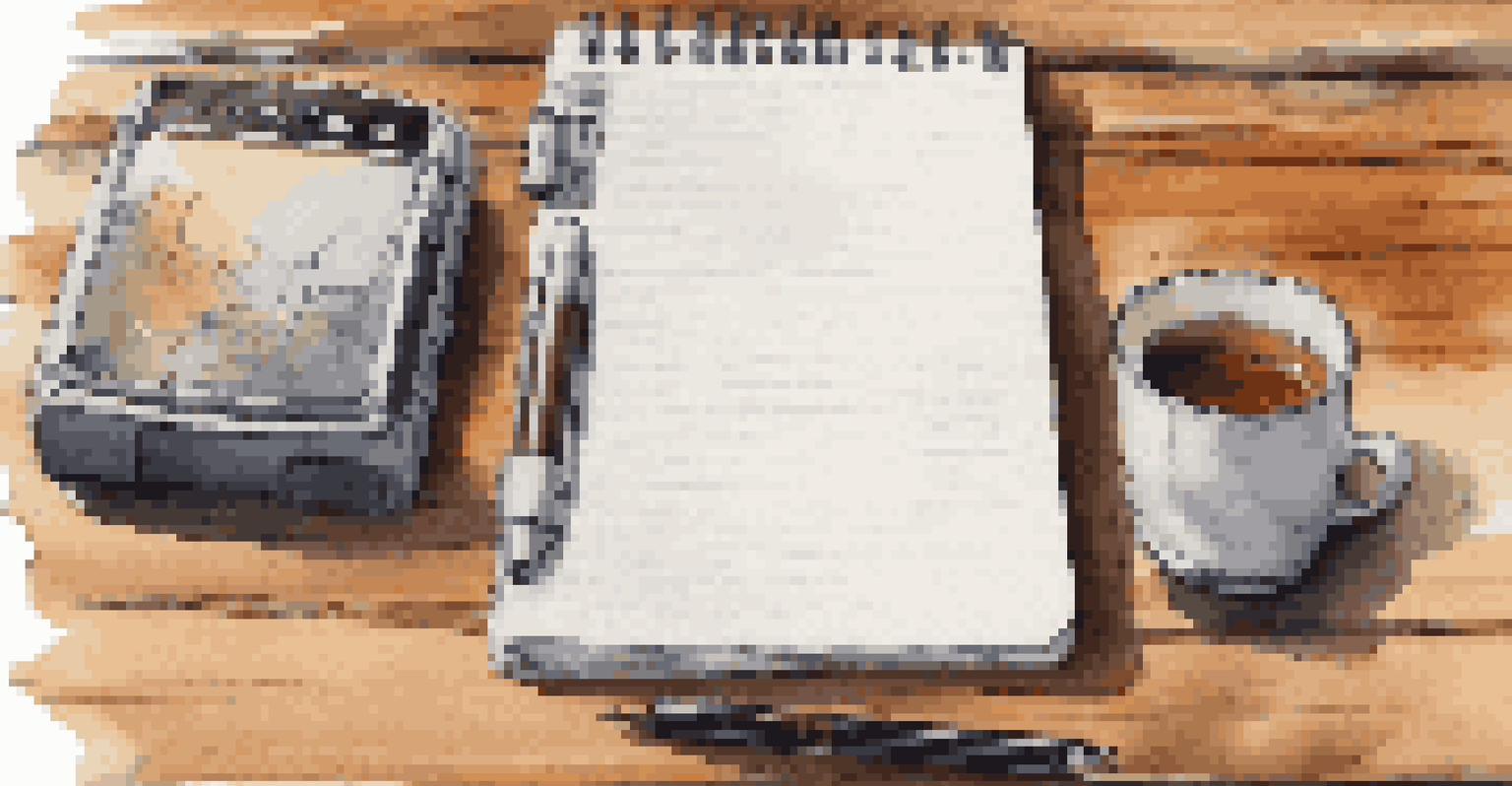How to Conduct Interviews for Music Critique Purposes

Understanding the Purpose of Music Critique Interviews
Before diving into interviews, it's crucial to understand their purpose. Music critique interviews aim to uncover deeper insights about an artist's work, creative process, and the emotions behind their music. This understanding helps shape your questions and approach, making the interview more meaningful.
Music is a world within itself, it's a language we all understand.
Think of these interviews as a way to bridge the gap between the artist's intentions and the audience's perceptions. By exploring the artist's journey, you can provide listeners with a richer context for the music. This connection ultimately enhances the critique, making it more engaging for your audience.
Additionally, recognizing the purpose of your critique can guide the tone and style of your writing. Whether you aim to inform, entertain, or provoke thought, aligning your interview strategy with your overall critique objectives will lead to more coherent and impactful results.
Preparing Thoughtful Questions for Artists
Crafting the right questions is key to a successful interview. Start by researching the artist’s background, influences, and previous works. This knowledge will help you develop questions that are both insightful and relevant, encouraging deeper conversations about their music.

Consider using open-ended questions to allow the artist to express themselves fully. Instead of asking yes or no questions, try framing inquiries like, 'What inspired the themes in your latest album?' This approach invites more elaborate responses and often leads to unexpected revelations.
Purpose of Music Critique Interviews
These interviews aim to uncover insights about the artist's work and creative process, enriching the audience's understanding.
Don’t forget to include follow-up questions based on their answers. This not only shows that you’re engaged but also allows for a natural flow in the conversation. Remember, the goal is to create an environment where the artist feels comfortable sharing their thoughts and experiences.
Choosing the Right Setting for Interviews
The setting of your interview can significantly impact the quality of the conversation. Ideally, choose a location where the artist feels at ease, whether it’s a cozy café, their studio, or even a quiet park. A comfortable atmosphere encourages openness and authenticity.
The role of a writer is not to say what we all can say, but what we are unable to say.
Consider the acoustics and potential distractions of the environment. An overly noisy setting can make it difficult to capture clear audio and may hinder the flow of discussion. Aim for a location that balances comfort with a professional vibe, ensuring that both you and the artist can focus on the conversation.
If meeting in person isn’t feasible, virtual interviews are a great alternative. Just make sure to test your technology beforehand to avoid any technical hiccups. Regardless of the setting, creating a welcoming environment is key to fostering a productive dialogue.
Establishing Rapport with the Artist
Building rapport is essential for an engaging interview. Start with some light conversation to break the ice, discussing topics like their latest tour or favorite music. This helps create a relaxed atmosphere and shows the artist that you're genuinely interested in their world.
Acknowledge their achievements and contributions to the music scene, as this not only flatters but also fosters mutual respect. When artists feel valued, they are more likely to open up about their experiences and insights, leading to a richer dialogue.
Crafting Thoughtful Questions
Asking open-ended questions encourages deeper conversations and allows artists to share their experiences more fully.
Don't underestimate the power of active listening. Show that you're engaged by nodding, maintaining eye contact, and responding thoughtfully to their comments. This encouragement can lead to deeper discussions and make the artist feel truly heard.
Incorporating Personal Experiences in Your Questions
One effective way to deepen your interviews is by sharing your personal experiences related to the artist's work. This can create a more relatable atmosphere and prompt the artist to share their thoughts on similar experiences. For instance, if you have a particular song that resonates with you, ask them what inspired that track.
By weaving in your own stories, you create a sense of connection that can lead to richer, more meaningful discussions. It also shows the artist how their music impacts listeners, providing them with valuable feedback.
However, be cautious not to dominate the conversation. Your experiences should serve as a springboard for the artist to express their thoughts, not overshadow their voice. Striking this balance is key to a successful and engaging interview.
Recording and Taking Notes During the Interview
To capture the essence of the conversation, it's important to record the interview, with the artist's permission, of course. This ensures you won’t miss any valuable insights while you’re engaged in dialogue. Use a reliable recording device or app to maintain high audio quality, allowing you to focus on the conversation.
In addition to recording, jotting down notes can help you remember key points and emotions expressed during the interview. This dual approach allows you to capture both the nuances of the conversation and your immediate reactions, which can enrich your critique later on.
Recording and Note-Taking Essentials
Recording interviews and taking notes ensures that valuable insights are captured accurately for a more impactful critique.
After the interview, listen to the recording and compare it with your notes. This process not only helps in accurately portraying the artist’s voice but also allows you to identify themes or quotes that can enhance your critique, making it more impactful.
Crafting Your Music Critique Post-Interview
Once the interview concludes, it’s time to transform your insights into a compelling critique. Start by revisiting your notes and the recording, identifying the most powerful quotes and themes that emerged during the conversation. This will help you weave the artist's perspective seamlessly into your critique.
Consider structuring your critique around key concepts discussed during the interview. For instance, if the artist spoke about their creative process, delve into how that is reflected in their music. This approach not only enriches your critique but also provides readers with a well-rounded understanding of the artist’s intent.

Finally, remember to maintain your unique voice throughout the critique. While the artist's insights are invaluable, your perspective adds depth and personal touch. Balancing these elements will create a critique that resonates with your audience and honors the artist's contributions.